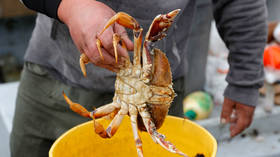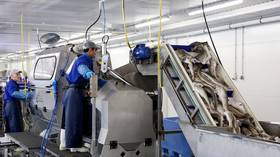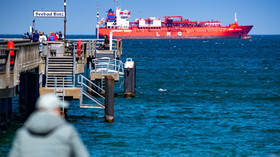Russian snow crab imports flood Japanese market – media

The cost of crab meat in Japan has fallen dramatically due to a sharp increase of imports from Russia, Nikkei reported on Saturday, citing the US embargo on purchases of Russian seafood as the prime mover for the influx.
The share of Russian crab meat of total Japanese imports reportedly amounted to 68.8% in the first three quarters of the current year compared to 64.8% and 5% recorded over the same period in 2022 and 2021 respectively. In that time frame, Japan imported crab meat worth 35.8 billion yen (some $244 million) with products worth 24.6 billion yen ($167 million) shipped from Russia.
Prices of Russian-caught snow crabs currently fetch about 2,000 yen ($14) per kilogram in the Japanese wholesale market, marking a drop of 33% compared to 2022’s average.
Meanwhile, Canadian crab meat sells for 1,800 yen per kilogram, while the cost per kg of Norway’s product hovers around 1,900, marking a major decline of 32% and 51% respectively from last year’s average prices. Russian-sourced red king crab is sold at about 5,000 yen per kilogram, a 38% discount from 2022’s average.
At the same time, wholesale prices for Japan-caught crab meat, which is seen as more of a luxury, level in between 15,000 yen to 16,000 yen per kilogram, nearly 20% higher than they were last year.
“Consumers see domestic-caught crab as different product from imported crab, so we’re not seeing competition between them,” a source familiar with Japan’s market told the media.
The US, once the biggest consumer of Russian crab meat, introduced an embargo on the import of seafood, vodka and diamonds from Russia in March 2022 as part of sanctions imposed on Moscow over the fighting in Ukraine. The ban forced Russian producers to divert their supplies to Asian markets, in particular to Japan.
Japan, in turn, hiked tariffs on Russian seafood in April 2022, but the ban does not target wholesale imports. Adding Russian crab meat to the blacklist “would have a large impact on Japan’s seafood processing industry,” according to a representative at the country’s Fisheries Agency, as cited by Nikkei.
For more stories on economy & finance visit RT's business section





















